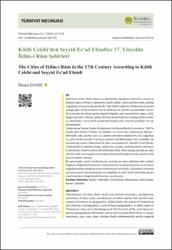Kâtib Çelebi’den Seyyid Es‘ad Efendiye 17. Yüzyılda İklîm-i Rûm Şehirleri
Künye
DANIŞ, İlhami. "Kâtib Çelebi’den Seyyid Es‘ad Efendiye 17. Yüzyılda İklîm-i Rûm Şehirleri". Türkiyat Mecmuası, 32.1 (2022): 217-274.Özet
Şehirlerin tarihi, fiziki, beşeri ve ekonomik coğrafyası, konumu, sosyal ve
kültürel yapısı, mimarisi, ekonomisi, tarihi, yolları, yakın şehirlere olan uzaklığı
coğrafyacının başlıca ilgi alanlarıdır. Tıpkı Kâtib Çelebi’nin Cihânnümâ eserinde
olduğu gibi. Cihânnümâ’nın her iki telifinde de şehirler ön plandadır. Eserin
ilk kısmında ele alınan genel coğrafi bilgiden yani yeryüzünün yapısı, şekli,
dağlar, denizler, nehirler, göller, iklimler (matematiksel ve bölgesel konumlar)
ve ülkelerden sonra farklı kıtalardaki birçok şehir önemli özellikleri ile ele
alınmaktadır.
Süleymaniye Yazma Eserler Kütüphanesi’nin Murad Molla Kısmında nr. 1803’te
kayıtlı olan Esâmî-i’l-Aktâr ve’l-Büldân ve’l-Kurâ min Cihânnümâ (Beyân-ı
Memâlik) adlı yazma eser ise sadece şehirlere odaklanmış bir coğrafya
ve şehir tarihi eseridir. Eserin en önemli özelliklerinden biri isminden de
anlaşılacağı üzere Cihânnümâ ile olan münasebetidir. Müellifi Es‘ad Efendi,
Cihânnümâ’yı mütalaa ettiği süreçte bu risaleyi yazmaya karar vermiştir.
Es‘ad Efendi, Cihânnümâ’nın ilk telifindeki İklîm-i Rûm başlığı altında yer alan
şehirleri harf sırasına göre tasnif ederek kendi belirlediği konular çerçevesinde
eserini kaleme almıştır.
Bu çalışmada, eserin muhtevasına, eserde yer alan şehirlere dair verilen
bilgilerin değerlendirilmesine, Cihânnümâ ile karşılaştırılmasına ve Osmanlı
coğrafya literatüründe bu eserin önemine yer verilmiştir. Çalışmanın sonunda
yer alan eserin transkripsiyonu ise coğrafya ve şehir tarihi alanında çalışan
araştırmacıların değerlendirilmesine sunulmuştur. The locations of cities, their social and cultural structures, architecture,
economies, history, roads, and distances to other nearby cities are the main
subjects of interest to geographers. Kâtib Çelebi, the author of Cihânnümâ
[An Ottoman Cosmography], is one of those geographers. In both copies of
Cihânnümâ, cities are in the foreground. The first part of the work discusses
general geographical information such as the structure of the Earth, its shape,
mountains, seas, rivers, lakes, climates (both mathematically and by regional locations), and countries, after which the work describes many cities on different continents through their important features.
The work Esâmî-i’l-Aktâr ve’l-Büldân ve’l-Kurâ min Cihannümâ (Beyân-ı Memâlik) is registered under no.1803 in the
Murad Molla Section of the Süleymaniye Manuscripts Library and exclusively contains information about cities. One of
the most important features of the work, as the name itself suggests, is its relationship with Cihânnümâ. Its author, Es‘ad
Efendi, decided to write this work while he was pondering Cihânnümâ. Es‘ad Efendi had classified cities in alphabetical
order under the heading Iklîm-i Rûm in the manuscript of the first edition of Cihânnümâ and rewrote them within the
framework of certain subjects he had determined.
This study comparatively discusses and evaluates the contents and the information given about the cities in the work
and compares the two versions of Cihânnümâ and their importance in the literature on Ottoman geography. The end
of the study presents the text of the work for researchers working in the field of geography and city history to evaluate.
Kaynak
Türkiyat MecmuasıCilt
32Sayı
1Bağlantı
https://dergipark.org.tr/tr/pub/iuturkiyat/issue/70933/1091793https://hdl.handle.net/11352/4133



















